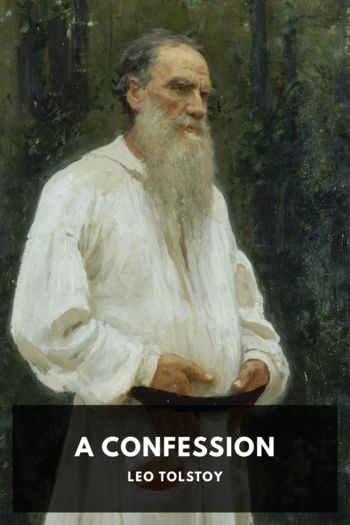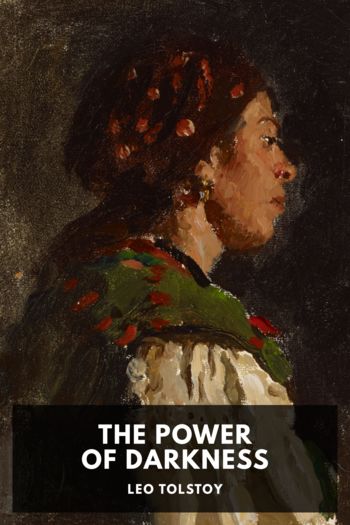Resurrection by Leo Tolstoy (best sci fi novels of all time TXT) 📕

- Author: Leo Tolstoy
Book online «Resurrection by Leo Tolstoy (best sci fi novels of all time TXT) 📕». Author Leo Tolstoy
“And whom have you for an advocate?”
“I have spoken to Fanárin.”
“Dear me, Fanárin!” said Máslennikoff, with a grimace, recollecting how this Fanárin had examined him as a witness at a trial the year before and had, in the politest manner, held him up to ridicule for half an hour.
“I should not advise you to have anything to do with him. Fanárin est un homme taré.”
“I have one more request to make,” said Nekhlúdoff, without answering him. “There’s a girl whom I knew long ago, a teacher; she is a very pitiable little thing, and is now also imprisoned, and would like to see me. Could you give me a permission to visit her?”
Máslennikoff bent his head on one side and considered.
“She’s a political one?”
“Yes, I have been told so.”
“Well, you see, only relatives get permission to visit political prisoners. Still, I’ll give you an open order. Je sais que vous n’abuserez pas. What’s the name of your protégée? Doúkhova? Elle est jolie?”
“Hideuse.”
Máslennikoff shook his head disapprovingly, went up to the table, and wrote on a sheet of paper, with a printed heading: “The bearer, Prince Dmítri Ivánovitch Nekhlúdoff, is to be allowed to interview in the prison office the meschánka Máslova, and also the medical assistant, Doúkhova,” and he finished with an elaborate flourish.
“Now you’ll be able to see what order we have got there. And it is very difficult to keep order, it is so crowded, especially with people condemned to exile; but I watch strictly, and love the work. You will see they are very comfortable and contented. But one must know how to deal with them. Only a few days ago we had a little trouble—insubordination; another would have called it mutiny, and would have made many miserable, but with us it all passed quietly. We must have solicitude on one hand, firmness and power on the other,” and he clenched the fat, white, turquoise-ringed fist, which issued out of the starched cuff of his shirt sleeve, fastened with a gold stud. “Solicitude and firm power.”
“Well, I don’t know about that,” said Nekhlúdoff. “I went there twice, and felt very much depressed.”
“Do you know, you ought to get acquainted with the Countess Pássek,” continued Máslennikoff, growing talkative. “She has given herself up entirely to this sort of work. Elle fait beaucoup de bien. Thanks to her—and, perhaps I may add without false modesty, to me—everything has been changed, changed in such a way that the former horrors no longer exist, and they are really quite comfortable there. Well, you’ll see. There’s Fanárin. I do not know him personally; besides, my social position keeps our ways apart; but he is positively a bad man, and besides, he takes the liberty of saying such things in the court—such things!”
“Well, thank you,” Nekhlúdoff said, taking the paper, and without listening further he bade good day to his former comrade.
“And won’t you go in to see my wife?”
“No, pray excuse me; I have no time now.”
“Dear me, why she will never forgive me,” said Máslennikoff, accompanying his old acquaintance down to the first landing, as he was in the habit of doing to persons of not the greatest, but the second greatest importance, with whom he classed Nekhlúdoff; “now do go in, if only for a moment.”
But Nekhlúdoff remained firm; and while the footman and the doorkeeper rushed to give him his stick and overcoat, and opened the door, outside of which there stood a policeman, Nekhlúdoff repeated that he really could not come in.
“Well, then; on Thursday, please. It is her ‘at-home.’ I will tell her you will come,” shouted Máslennikoff from the stairs.
LINekhlúdoff drove that day straight from Máslennikoff’s to the prison, and went to the inspector’s lodging, which he now knew. He was again struck by the sounds of the same piano of inferior quality; but this time it was not a rhapsody that was being played, but exercises by Clementi, again with the same vigour, distinctness, and quickness. The servant with the bandaged eye said the inspector was in, and showed Nekhlúdoff to a small drawing-room, in which there stood a sofa and, in front of it, a table, with a large lamp, which stood on a piece of crochet work, and the paper shade of which was burnt on one side. The chief inspector entered, with his usual sad and weary look.
“Take a seat, please. What is it you want?” he said, buttoning up the middle button of his uniform.
“I have just been to the vice-governor’s, and got this order from him. I should like to see the prisoner Máslova.”
“Márkova?” asked the inspector, unable to bear distinctly because of the music.
“Máslova!”
“Well, yes.” The inspector got up and went to the door whence proceeded Clementi’s roulades.
“Mary, can’t you stop just a minute?” he said, in a voice that showed that this music was the bane of his life. “One can’t hear a word.”
The piano was silent, but one could hear the sound of reluctant steps, and someone looked in at the door.
The inspector seemed to feel eased by the interval of silence, lit a thick cigarette of weak tobacco, and offered one to Nekhlúdoff.
Nekhlúdoff refused.
“What I want is to see Máslova.”
“Oh, yes, that can be managed. Now, then, what do you want?” he said, addressing a little girl of five or six, who came into the room and walked up to her father with her head turned towards Nekhlúdoff, and her eyes fixed on him.
“There, now, you’ll fall down,” said the inspector, smiling, as the little girl ran up to him, and, not looking where she was going, caught her foot in a little rug.
“Well, then, if I may, I





Comments (0)